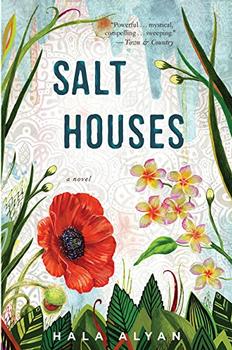Summary | Excerpt | Reading Guide | Discuss | Reviews | Beyond the Book | Readalikes | Genres & Themes | Author Bio

SALMA
Nablus
March 1963
When Salma peers into her daughter's coffee cup, she knows instantly she must lie. Alia has left a smudge of coral lipstick on the rim. The cup is ivory, intricate spirals and whorls painted on the exterior in blue, a thin crack snaking down one side. The cup belongs to a newer set, bought here in Nablus when Salma and her husband, Hussam, arrived nearly fifteen years ago. It was the first thing she'd bought, walking through the marketplace in an unfamiliar city.
In a stall draped with camelhair coats and rugs, Salma spotted the coffee set, twelve cups stacked next to an ibrik with a slender spout. They rested upon a silver tray. It was the tray that gave Salma pause, the triangular pattern so similar to the one her own mother gave her when she first wed. But it was gone, the old tray and coffee set, along with so many of their belongings, the dresses and walnut furniture and Hussam's books. All left behind in that villa, painted the color of peach flesh, that had been their home.
Salma cried out when she saw the tray, pointed it out to the vendor. He refused to sell it without the coffee set and so she'd taken it all, walking home with the large, newspaper-swathed bundle. It was her first satisfaction in Nablus.
Over the years she has presented the tray in the same arrangement, the ibrik in the center, the cups, petal-like, encircling it. Twice a month the maid takes the tray and other silverware onto the veranda and carefully dabs them with vinegar. It hasn't lost its gleam.
The cups, however, are well worn. Hundreds of times, Salma has placed a saucer over the rim and flipped the cup upside down, waiting for the coffee dregs to dry. She prefers to wait ten minutes but often becomes occupied with her guests, only to remember much later with a hasty "Oh!" And the cup would be righted, the coffee remnants leaving desiccated, grainy streaks that stained the porcelain a faded brunette hue.
This time, Salma is barely able to wait the customary ten minutes. She listens to the women discuss the weather and whether or not the warmth will last until the wedding tomorrow. It will be held in the banquet hall of a nearby hotel, one that has hosted dignitaries and mayors and even a film star, once, in the fifties. Silk bows have already been tied to the backs of the chairs; tea-light candles set in arcs around the plates wait for flames. When lit, they will look like a constellation. Salma has already tested this, she and the concierge circling the tables and kissing the tips of matches to wicks. The concierge dimmed the lights, and the effect, incandescent and lovely, had warmed Salma.
"Throw out the candles. I'll order new ones," she'd told the concierge, aware of his eyes on her, the begrudging awe. Extravagance. But it is Alia, Alia to be wed, and no expense is to be spared. No blackened candles with miserable wick-nubs around the table settings.
With Widad, it was different. Ten years earlier, Salma sat silently throughout her eldest's wedding ceremony, a pitiful gathering in the mosque, the scent of incense potent around them. When the imam read the Fatiha, Widad started to cry. Her father had died three months earlier. The dying had taken years. Salma would sit beside him after praying fajr and listen to the clatter his chest made as he drew air in and released it. The first light of the day would slowly fill their bedroom. Salma spoke directly to God during those minutes, in a manner that felt shameless to her. She asked for her husband to live. She knew it was selfish, knew his life with its morphine and bloody handkerchiefs wasn't one he wanted to keep.
More than once he cried out into the night, "They took my home, they took my lungs. Kill me, kill me." Hussam fiercely believed his illness was tied to the occupation of Jaffa, the city with the peach-colored house they'd left behind.
Excerpted from Salt Houses by Hala Alyan. Copyright © 2017 by Hala Alyan. Used by permission of Houghton Mifflin Harcourt Publishing Company. All rights reserved.
Your guide toexceptional books
BookBrowse seeks out and recommends the best in contemporary fiction and nonfiction—books that not only engage and entertain but also deepen our understanding of ourselves and the world around us.